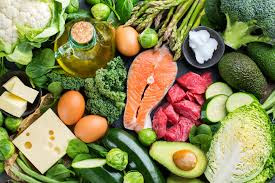
In a world flooded with diet trends and weight loss plans, the low-carb diet stands out as one of the most popular — and effective — options. From celebrities to fitness influencers, many credit cutting carbs for helping them shed stubborn pounds. But what exactly is a low-carb diet? How does it work? And is it truly healthy?
Let’s unpack the facts and explore how a low-carb lifestyle can support real, sustainable weight loss.
What Is a Low-Carb Diet?
A low-carb diet is exactly what it sounds like — a way of eating that limits carbohydrate intake, focusing instead on proteins, healthy fats, and non-starchy vegetables.
Carbohydrates include sugar, bread, rice, pasta, potatoes, sweets, and many packaged foods. While carbs are an important energy source, excess intake — especially refined carbs — can lead to weight gain, insulin resistance, and other metabolic issues.
There are different levels of low-carb eating:
-
Moderate low-carb: 100–150g of carbs/day
-
Low-carb: 50–100g of carbs/day
-
Very low-carb or keto: under 50g of carbs/day
How Does It Help With Weight Loss?
Here’s how a low-carb diet supports weight loss:
1. Reduces Hunger
Protein and fat are more filling than carbs. By focusing on these, you feel full longer and naturally eat less without counting calories.
2. Lowers Insulin Levels
Carbs raise insulin, a hormone that helps store fat. When you eat fewer carbs, insulin levels drop, which can make it easier for your body to burn stored fat for fuel.
3. Encourages Fat Burning
With fewer carbs, your body switches from using glucose (sugar) as its primary energy source to burning stored fat. This process is called ketosis (in very low-carb diets) or fat adaptation in moderate ones.
4. Reduces Water Retention
Carbs cause the body to retain water. Cutting carbs often leads to rapid water weight loss in the first week, giving you a quick motivational boost.
What Can You Eat on a Low-Carb Diet?
.jpeg)
A healthy low-carb plate should include:
Proteins
-
Eggs, chicken, turkey, beef, lamb, fish, tofu
Healthy Fats
-
Olive oil, coconut oil, avocado, nuts, seeds
Non-Starchy Vegetables
-
Leafy greens, broccoli, zucchini, cauliflower, mushrooms, bell peppers
Limited Fruits
-
Berries in moderation (strawberries, blueberries, raspberries)
Dairy (if tolerated)
-
Cheese, Greek yogurt, cream
What Should You Avoid?
-
Sugary foods: soda, candies, cakes, pastries
-
White bread, rice, pasta
-
Chips, crackers, and most packaged snacks
-
Fruit juices, sweetened drinks
-
High-carb fruits like bananas, grapes, and mangoes (in large amounts)
-
Beer and sweetened alcohol
Sample Low-Carb Meal Plan (One Day)

Breakfast
-
Scrambled eggs with spinach and cheese
-
Black coffee or unsweetened herbal tea
Lunch
-
Grilled chicken salad with olive oil dressing
-
A handful of almonds
Snack
-
Greek yogurt with a few berries
Dinner
-
Baked salmon with roasted cauliflower and zucchini
Optional Dessert
-
Dark chocolate (85% cocoa) or a few nuts
Potential Benefits Beyond Weight Loss
-
Better blood sugar control (helpful for prediabetics and diabetics)
-
Reduced belly fat, which is linked to heart disease
-
Improved energy levels and reduced “crash” feelings after meals
-
Clearer thinking and fewer cravings for junk food
Things to Consider Before Starting
-
Keto flu: If going very low-carb, you might feel tired or foggy for a few days. This passes as your body adjusts.
-
Fiber intake: Make sure to eat enough veggies and seeds to stay regular.
-
Sustainability: It’s not about avoiding carbs forever, but learning to balance them wisely.
-
Medical advice: If you have health conditions like diabetes, kidney issues, or are on medications, consult a healthcare provider before starting.
Is a Low-Carb Diet Right for You?
A low-carb diet isn't a one-size-fits-all plan, but it can be incredibly effective, especially for people who:
-
Struggle with sugar cravings
-
Have a slow metabolism
-
Have insulin resistance or PCOS
-
Want to reduce bloating and belly fat
-
Prefer hearty, savory foods over sweet ones
If done mindfully, with a focus on whole, unprocessed foods, a low-carb diet can help reset your eating habits, boost your energy, and support real, long-term weight loss.
Final Thoughts
The low-carb diet isn’t about cutting out all joy or flavor — it’s about making smarter food choices that fuel your body and help you feel your best. From weight loss to improved mental clarity, the benefits are clear when you eat in a way that works with your body, not against it.
Start small, stay consistent, and give yourself grace. Real change doesn’t happen overnight — but with the right fuel, it does happen.
.jpeg)
